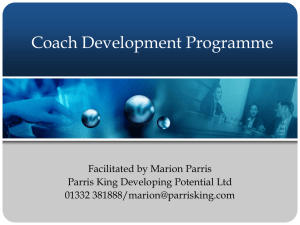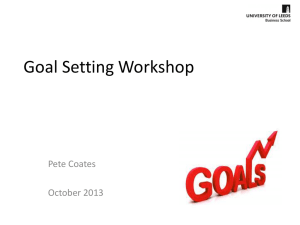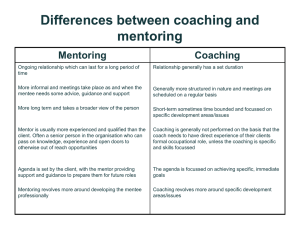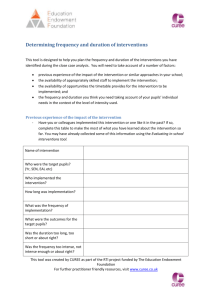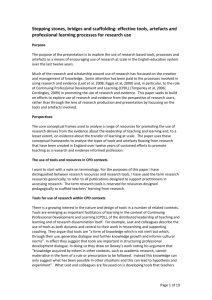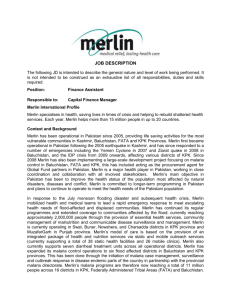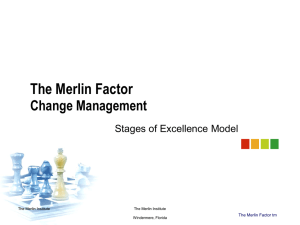How can research improve classroom practice?
advertisement
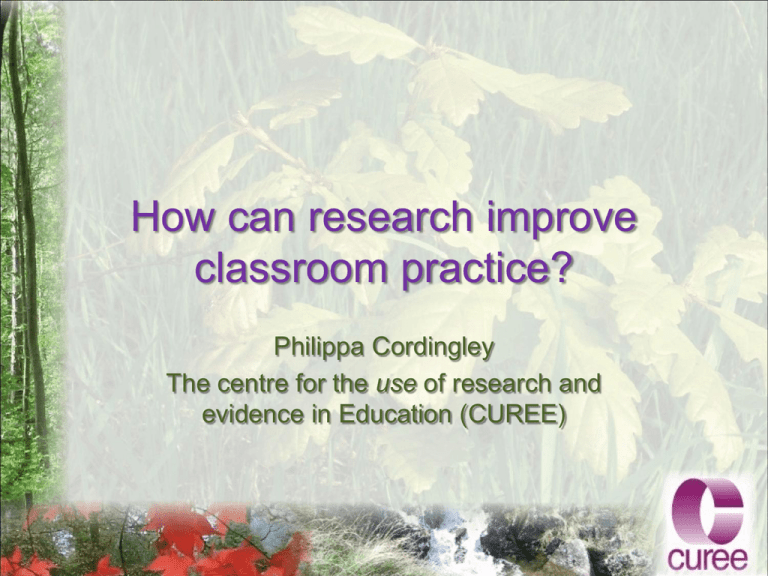
How can research improve classroom practice? Philippa Cordingley The centre for the use of research and evidence in Education (CUREE) How can research improve classroom practice? This session Exploring connections between the two worlds Understanding the roles of Continuing Professional Development and knowledge management/ mobilisation Practising what we preach – via systematic reviews- at individual & system level A case study from England A final metaphor Knowledge models What’s the relationship/ flow between the two? Looking closely at users and use – Research - process - outcome – agent? Mobilising knowledge and focussing research will help - but Teachers improve classroom practice So research > improvement means looking at how they improve practice - Continuing Professional Development and Learning (CPDL) IE applying research about pedagogy and about CPDL – practising what we preach Finding out about teaching - What can and can’t research do? Research – the issue, a tool for thinking, or for action? Practising what we preach - modelling Lack of use of research by teachers parallel to classroom teachers whose students struggle What would we do then? “I’ll have what he’s having!” Systematic reviews about CPDL 4 quality assured reviews into impact of CPDL to shape CPDL – and CUREE’s work Explored impact on pupils as well as teachers Over 2,000 studies via comprehensive searches Double blind filtering and weighing of evidence 300 relevant studies identified & coded Data extracted & evidence weighed for 45 Very strong coherence with findings from the Timperley CPD Best Evidence Synthesis Benefits Evidence about from 4 systematic reviews about CPDL linked to improvements in student: motivation, responses to specific subjects & curricula performance e.g. test results and specific skills organisation e.g. collaboration, selection of strategies questioning skills, thinking & responses to stimuli And teachers’ self-confidence e.g. in taking risks and efficacy willingness to continue professional learning willingness & ability to make changes to practice knowledge & understanding of subject & pedagogy repertoire strategies & ability to choose between them between Peer coaching 10-14 pairs of teachers – 24 hrs with researcher/practitioner Learn about aspect of practice and peer coaching Build peer coaching agreement for 12 weeks (min 4 peer coaching sessions) Follow up 24 hours – exploring students’ before and after work & strategies & looking at further development E.g. Assessment for learning, early years, thinking skills; behaviour, MFL Characteristics of CPD with these positive outcomes from across reviews The use of specialist external expertise Peer support to create trust, enable risk taking, generate commitment and Safety To Admit Need (STAN) Observation & deconstruction/feedback from specialists (what isn’t within reach on one’s own) Observation for learning - learning to learn from looking Characteristics of CPD with these positive outcomes from across reviews Structured dialogue rooted in evidence of experiments with learners Scope for participants, via collaboration, to identify own CPD starting points (within a given framework) Processes to encourage, extend & structure professional dialogue & reflection Effective use of time to embed practices in classrooms e.g. on-course planning What does that mean for how research improves practice? For individuals, research outputs need to prompt: Collaborative, active learning, Demonstrating an expectation that findings will be have to be interpreted for context Diagnosis – in context of student experiences Learning from looking Use of specialist expertise/ smart tools to explore beliefs, challenge with new ideas etc Checking this out We obviously also check that directly too via: Primary research eg with the National Teacher Research Panel Frequent Focus groups Monitoring use and take up At system level it means Investigating the issues of interest to practitioners Awareness raising re: range of useful research Securing understanding of core facts and issues Enabling practitioners to relate products to own experiences Providing access to theory / the underpinning rationale to enable transfer Encouraging and/or supporting practitioners in interpreting, testing & refining strategies from research in their own context Stepping stones Stepping stones from 2.5 minute “bites” – power points Tasters – micro enquiry tools based on nuggets of evidence ( 400+) Web digests Major summaries of cornerstone academic studies – hot linked to teachers’ studies A wide range of CPD tools and resources eg mystery games, treasure hunts Coaching based CPD programmes Using External Resources www.gtce.org.uk/research/tasters/ Key features: nuggets of evidence taken from the RfT summary enquiry activities to find out how learners experience phenomena now Ideas for taking next steps where to find out more A case study from England Systematic reviews translated into a national Policy Framework for mentoring and coaching 4 pages – principles, skills, core concepts ( who, what where why when) and a venn diagram showing links Use of research as improvement tool central: Facilitate access to research and evidence to support development Draw on evidence from research and practice to shape development. An example of a principle Research based resources A library designed to: communicate interconnected information illustrate components in context & via video make the evidence base explicit provide tools & activities for adaptation by practitioners Blended Learning resources for Effective mentoring and coaching... 21 Route Map Merlin, Arthur and use of research to improve practice The book of Merlin, T H White Merlin” said the King, “tell me the reason for your visit. Talk. Say you have come to save us from this war.” “No” replied his former tutor “it is hopeless doing things for other people. The only thing worth doing for the race is to increase the stock of ideas. Then, if you make available a larger and deeper stock, the people are at liberty to help themselves from out of it . By this process the means of improvement is offered, to be accepted or rejected according to their need. Such is our business, to open up new ideas (and practices).” “You did not tell me this before.” Replied Arthur “You have egged me into doing things all my life, the chivalry, the Round Table. What were these but efforts to save people and to improve how things are done? “They were ideas” said Merlin firmly, “rudimentary ideas. All thought in its early stages begins as action. The actions which you have been wading through have been ideas, clumsy ones of course, but they had to be established before we could begin to think in earnest. You have been teaching man to think.” “So my round table was not a failure Merlin?” - “Certainly not, It was an experiment”. Contact Details philippa.cordingley@curee.co.uk www.curee.co.uk Centre for the Use of Research and Evidence in Education 4 Copthall House Station Square Coventry CV1 2FL England +44 2476 524036


